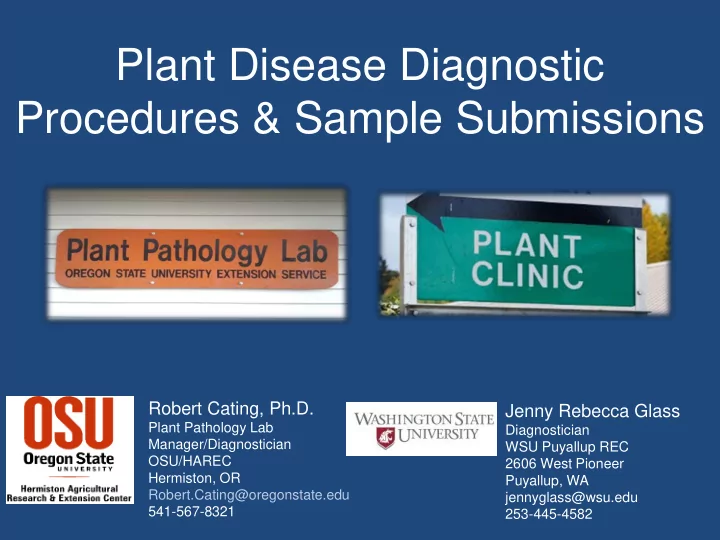

Plant Disease Diagnostic Procedures & Sample Submissions Robert Cating, Ph.D. Jenny Rebecca Glass Plant Pathology Lab Diagnostician Manager/Diagnostician WSU Puyallup REC OSU/HAREC 2606 West Pioneer Hermiston, OR Puyallup, WA Robert.Cating@oregonstate.edu jennyglass@wsu.edu 541-567-8321 253-445-4582
What we do: Determine the cause of plant problems • Abiotic Stresses Nutrient deficiencies Mechanical damage Air pollution • Pathogenic Diseases What harmed/is harming the plant & why ? Viruses Bacteria Fungi Phytoplasmas Nematodes • Certain labs offer arthropod ID services
Test, don’t guess!
How do we do this? • Gather information • Date, variety, % affected, previous crops, irrigation type, exposure, distribution, spray history
How do we do this? Initial examination • Roots, stems, leaves, tubers, fruit • Symptoms • Signs What should be done?
How do we do this? Microscopy
How do we do this? Initial examination • Roots, stems, leaves, tubers, fruit • Symptoms • Signs What should be done? ?
How do we do this? PCR assays • Viruses • Phytoplasmas • Other organisms unculturable or difficult to culture
How do we do this? PCR assays • PCR increases our level of detection-even latent pathogens • Can detect a few organisms/target genes Most viruses Phytoplasmas Bacteria Fungi • New primers can be designed & ordered within a few days
Results • Are the results consistent with symptoms, distribution, & field history? • In other words, based on the collected evidence, what is the cause? • Arrive at diagnosis
How to select plant samples Selecting Plant Samples • As much of the plant as possible • Roots, stems, leaves, soil, etc. • Dig samples, if possible • Plants at different stages of disease, not just the worst • Samples should be as fresh as possible
How to submit plant samples • Ship overnight or next day • Avoid shipping over the weekend • Store samples in cool, dry conditions • Wrap roots in damp towel, put in plastic bag • Ship in a box
What to include with plant samples • Fill out sample submission form • Provide as much information as possible • What, when, where, how…. • Pictures are very helpful • Close-ups • The Big Picture
OSU Hermiston http://oregonstate.edu/dept/hermiston/
Hermiston Plant Pathology Diagnostic Lab http://oregonstate.edu/dept/hermiston/plant-pathology-plant-lab-testing
OSU Plant Clinic, Corvallis http://plant-clinic.bpp.oregonstate.edu/
WSU Puyallup Plant Diagnostic Lab http://puyallup.wsu.edu/plantclinic/
WSU Plant Pest Diagnostic Clinic, Pullman http://plantpath.wsu.edu/diagnostics/ Reopening December 2015 plant.clinic@wsu.edu
Diagnostic Forms
Questions? Acknowledgements: PNVA www.pnva.org PNW-VEG http://mtvernon.wsu.edu/path _team/vegpath_team.htm
Recommend
More recommend